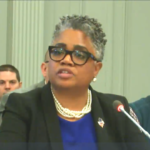
Newark Superintendent Skates Over Report on Anti-Black Racism at District High School
October 3, 2023
Education Commissioner Concedes State Tutoring Programs Are Falling Short of Projected Goals
October 4, 2023On Sex Education, the Murphy Administration and NJEA Leaders Have Lost the Plot
On the homepage for the New Jersey Education Association’s website is a category called “Rainbow Connection,” featuring the column below, “This is Your Month To Make Queer History,” published Monday and written by Kate Okeson and Amy Moran, teacher union members who advocate for the state’s LGBTQ-inclusive curricula.
That’s great and I applaud their advocacy. Yet have we reached a moment where we’re losing the plot as we relegate time spent on students’ academic needs to engage in extraneous topics? For instance, yesterday we reported that, based on spring standardized test results (which the Murphy Administration’s Department of Education hasn’t released publicly yet), only 19% of Newark district third-graders can read on grade-level. This may have something to do with the fact that New Jersey’s Student Learning Standards in reading haven’t been updated since 2016 and, while many other states have mandated that reading be taught effectively, NJ is still hemming and hawing. (Hopefully the new standards, which have been in draft form since April, will be approved by the State Board of Education at today’s public meeting. [Adding: see update here.])
Yet I fear, in the Murphy Administration’s dedication to “progressive values,” we’ve gotten our priorities upside down as the left wing of the Democratic Party continues to emphasize culture wars over basic skills. In the process, it’s lost the trust of parents and voters in New Jersey and throughout America.
In March a Stockton University poll found two-thirds of NJ parents think they should have more say in local decisions about the curricula schools teach.
In a poll in July conducted by Democrats for Education Reform, in four battleground states—Arizona, Georgia, Nevada and North Carolina — voters said they trusted Republicans more than Democrats to ensure “public schools are preparing students for success after high school by ensuring they are teaching students to read and do math well.”
Back in New Jersey, we saw signs of this growing distrust during the 2021 gubernatorial election which, despite polling projecting a significant lead by Murphy, ended up a squeaker, with GOP challenger Jack Ciattarelli coming within three points of winning. According to Murphy’s pollster, Danny Franklin, one of the reasons for the nailbiter—even though there are one million more Democratic registered voters in NJ than Republicans—is “the degree of trust that people may have in the people in power—not only Governor Murphy but the President, Congress, large institutions, to protect them.”
Remember, that same year Virginia’s gubernatorial race powered GOP challenger Glenn Youngkin over incumbent Terry McAuliffe, which some believe had at least something to do with the latter’s declaration, “I don’t think parents should be telling schools what they should teach.”
Sure, our children desperately need schools where they feel safe and included. But why can’t we walk and chew gum at the same time? Why is NJEA pushing teachers to “make queer history” instead of prioritizing core academic skills in the wake of COVID learning loss? Why has it taken so long for the state DOE to align reading instruction standards with what we now call the “science of reading? Is it because Murphy’s Commissioner, Angelica Allen-McMillan and her staff are preoccupied with current litigation against NJ school districts that don’t want parents telling schools what to teach?
Jonathan Chair warns that “Democrats around the country may lose the support of voters alienated by a faction that doesn’t see educational achievement as something important,” when, in fact, Americans do see this as important. (Chait estimates only 10% of Americans make up that tiny cohort that thinks otherwise and counsels Democratic leaders to bow to voters’ preferences—particularly Black and Brown parents—for public charter schools, especially in low-income cities like Newark.)
Our children, regardless of their gender identity, won’t make it if they don’t know how to read or do math. Isn’t this something we can agree on? Let’s get our priorities straight, folks.
Here’s the NJEA piece cited above:
This year, we challenge YOU to make queer history in ways you haven’t before! Consider adding some of these affirmations of LGBTQIA+ culture to your educational practices:
- Signal that you’re open to others’ authentic gender expression by adding your personal gender pronouns (PGPs) to your work e-signature. When writing your name on a whiteboard, add your pronouns to help normalize it for everyone.
- Put away “boys and girls” and “guys” when addressing students, and opt for something gender inclusive like “scholars,” “scientists,” “authors,” or “wonderful people.”
- People at home may be of any gender identity. When generalizing, put away “mom and dad,” and try “your grown-ups,” “your adult family members,” or simply “your folks.”
- Who is the Gender & Sexuality Alliance adviser at your school or in your district? Connect with them to see how you can support their work and how they and the GSA participants can help you guide your practices in ways that are even more LGBTQIA+ inclusive than last year.
- Remember: students can use the bathrooms and locker rooms and play on sports teams that align with their gender identity.
- Set a goal: If you included LGBTQIA+ themed literature, word problems, project options, or historic figures once per marking period last year, try doubling it this year.
Co-creating for change
Build sustainable changes through inclusive practices in partnership with colleagues. Many schools utilize professional learning communities (PLCs) to increase dialogue around educational programming, especially around deploying new lessons and materials.
Build your own team by working with a colleague or two who are willing to partner in the work. Two educators talking about a new lesson and sharing resources leads to conversations that transform your own thinking and practice even before you get to the lesson with students. For example: Lead a lesson that combines reporting (ELA, journalism) on recent science or medical discoveries (sciences) and evaluate who is being represented or underrepresented.
Who has your back?
Resources that back up the LGBTQIA+ affirming work you are doing can smooth over rough moments when working on inclusive lessons and providing wider representative experiences for students. You have New Jersey’s long history and commitment to equity in schools. Our curriculum mandates are law, are some of the most comprehensive nationally and are reflected in our state’s Student Learning Standards.
Decades of research back the outcomes-based approaches for LGBTQIA+ inclusion in school resources and curricula. Positive LGBTQIA+ visibility, through books in classroom and school libraries, lessons and materials that specifically name queer and transgender writers, characters, contributors, and topics create environments where students are seen—positively—and that impacts school belonging, attendance, discipline and GPA.
Intentional, diverse representation in school materials is in line with New Jersey’s Social Emotional Learning (SEL) competencies. Research also backs these foci as improving understanding, acceptance and respect in the classroom.
Know your rights. If you feel that something is not right, that you are being harassed or that negative attention is being paid to you, your students, or your work, reach out to your local association rep or local association president to seek support.
Further, know how the law protects people in places of public accommodation (public schools are places of public accommodation) by reviewing the fact sheets we have shared from the New Jersey Division on Civil Rights.
YES, you can do this! There are educators all over NJ ready to support you with guidance and ideas. Ask us at rainbowconnectionnjea@gmail.com.
Let’s enter the 2023-24 school year centering equity and justice. Remember to start with yourself.




